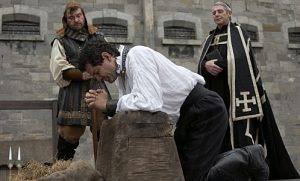“I am come hether to dye, … for … I am by the Lawe comdempned to die, and thanke my lorde God that hath appoynted me this deathe, for myne offence: For … I have lived a synner, and offended my Lorde God, for the whiche I aske hym hartely forgevenes. And … beyng but of a base degree, … have offended my prince, for the whiche I aske hym hartely forgevenes, and beseche you all to praie to God with me, that he will forgeve me. O father forgeve me. O sonne forgeve me, O holy Ghost forgeve me: O thre persons in one God forgeve me. And now I praie you that be here, to beare me record, I die in the Catholicke faithe … . Many hath sclaundered me, and reported that I have … mainteigned evill opinions, whiche is untrue, but I confesse that like as God by his holy spirite, doth instruct us in the truthe, so the devill is redy to seduce us, and I have been seduced: but beare me witnes that I dye in the Catholicke faithe … . And I hartely desire you to praie for the Kynges grace, that he maie long … reigne over you. And once again I desire you to pray for me, that so long as life remaigneth in this fleshe, I waver nothyng in my faithe”.
And of his last moment Hall writes:
“.... committed his soule, into the handes of God, and so paciently suffered the stroke of the axe, by a ragged and Boocherly miser, whiche very ungoodly perfourmed the Office.
After his execution, Cromwell's head was boiled and placed on a spike on London Bridge, his face it was said, looking away from the city. I often wonder about men like Cromwell - why were they so eager to take the place of others who had gone to the block for not giving Henry what he wanted. Cromwell was in the pay of Cardinal Wolsey when he fell from grace in 1529, if he didn't learn anything then surely he must have been aware of the consequences of failing Henry when Thomas More was executed in 1535.
Or did he really think he was invincible?


 RSS Feed
RSS Feed
